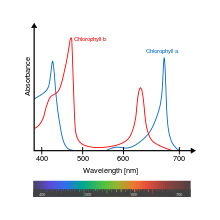Chlorophyll b
 | |
| Names | |
|---|---|
| IUPAC name
Chlorophyll b | |
| Systematic IUPAC name
Magnesium [methyl (3S,4S,21R)-14-ethyl-13-formyl-4,8,18-trimethyl-20-oxo-3-(3-oxo-3-{[(2E,7R,11R)-3,7,11,15-tetramethyl-2-hexadecen-1-yl]oxy}propyl)-9-vinyl-21-phorbinecarboxylatato(2-)-κ2N,N'] | |
| Other names
β-Chlorophyll | |
| Identifiers | |
| 519-62-0 | |
| 3D model (Jmol) | Interactive image |
| ChemSpider | 16739843 |
| ECHA InfoCard | 100.007.522 |
| EC Number | 208-272-4 |
| E number | E140 (colours) |
| PubChem | 6450186 11593175 (from spinach) |
| UNII | 5712ZB110R |
| |
| |
| Properties | |
| C55H70MgN4O6 | |
| Molar mass | 907.49 g·mol−1 |
| Appearance | Green |
| Odor | Odorless |
| Melting point | ~ 125 °C (257 °F; 398 K)[1] |
| Insoluble[1] | |
| Solubility | Very soluble in EtOH, ether, C5H5N Soluble in MeOH[1] |
| Absorbance | See text |
| Except where otherwise noted, data are given for materials in their standard state (at 25 °C [77 °F], 100 kPa). | |
| | |

The absorption spectrum of both the chlorophyll a and the chlorophyll b pigments. The use of both together enhances the size of the absorption of light for producing energy.
Chlorophyll b is a form of chlorophyll. Chlorophyll b helps in photosynthesis by absorbing light energy. It is more soluble than chlorophyll a in polar solvents because of its carbonyl group. Its color is yellow, and it primarily absorbs blue light.[2]
In land plants, the light-harvesting antennae around photosystem II contain the majority of chlorophyll b. Hence, in shade-adapted chloroplasts, which have an increased ratio of photosystem II to photosystem I, there is a higher ratio of chlorophyll b to chlorophyll a.[3] This is adaptive, as increasing chlorophyll b increases the range of wavelengths absorbed by the shade chloroplasts.
 |  |
References
- 1 2 3 Lide, David R., ed. (2009). CRC Handbook of Chemistry and Physics (90th ed.). Boca Raton, Florida: CRC Press. ISBN 978-1-4200-9084-0.
- ↑ photosynthesis pigments
- ↑ Kitajima and Hogan 2003
This article is issued from Wikipedia - version of the 6/29/2016. The text is available under the Creative Commons Attribution/Share Alike but additional terms may apply for the media files.
